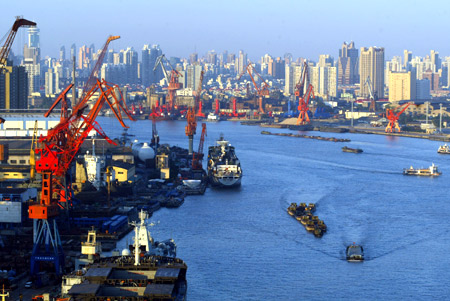Top Biz News
China's shipping industry woes
By Andrew Moody and Wang Xiaotian (China Daily)
Updated: 2009-11-30 08:01
|
This Jiangnan Shipyard photo was taken two years ago at No 2 Gaoxionglu Street in Shanghai. Now the 143-year-old shipyard has moved to Shanghai's Changxing Island, and the former location will become the site of facilities that will serve the 2010 Shanghai Expo. [CFP] |
Wei Jiafu, president and chief executive officer of Cosco, the State-owned shipping line, said increasing globalization has contributed to the problems facing the world's shipping industry.
"Just like a coin has two sides, globalization helps to stimulate shipping prosperity from one side. From the other side, globalization has also played a role with the US subprime crisis becoming a world financial crisis and heavily striking trade and shipping."
But Andre Toet, chief operations officer of the Port of Rotterdam, who has long experience in the industry, said problems have been greater in previous economic downturns.
"I don't think it is the deepest recession I have seen in my career. The speed with which it occurred is certainly unprecedented," he said.
Toet said that although there are overcapacity problems in China, it is still likely to be the engine of any shipping recovery.
"China has such a prominent place in global shipping and trade. That is where we are looking for growth, " he said.
Apart from scrapping, one solution to current overcapacity is for ships to move into super-slow steaming mode.
This keeps ships operational and avoids having to lay up ships, which is not only a very costly exercise but also very time-consuming.
Slowing steaming
Slowing down ships also reduces fuel costs, results in lower CO2 emissions and creates greater schedule reliability, since ships can increase their speed if they fall behind.
Tim Smith, chief executive of Maersk Line for North Asia, said it has proven an effective strategy for the current crisis.
"Not only does it absorb extra capacity, but we achieve significant cost savings and CO2 emissions reductions," Smith said.
Super-slow steaming might help the shipping lines, but it will do little for Chinese shipyards confronting an overcapacity crisis. Some believe the most effective solution would be to turn much of this capacity over to recycling ships.
Ships can be taken apart with the steel being turned into steel rods for the construction industry, lessening China's dependence on imported iron ore. The engines of ships can also be reused in power generation plants.
Bowring of the Hong Kong Shipowners Association said it would be an effective use of all the excess capacity.
"It would give the industry something to do for the next 10 years, and it would mean it would be well placed for when the demand for new ships does pick up again," he said.
"You preserve all the skills of your labor force, and you give the industry the chance to catch up with itself again."
Although the world's shipping industry has been seriously thrown off kilter, a quick upturn in the world economy next year could go a long way to restoring equilibrium.
Wei of Cosco said that no one should rule out the prospect of a possible rapid increase in trade.
"Year-on-year GDP growth in the first six months reached 7.7 percent. Moreover, industrial production growth has been accelerating. Although it is too early to conclude that the global depression is over, the fast V shape recovery is not impossible," he said.
Megan McCurdy, head of marine research and consulting activities at Poten & Partners, the New York-based broker and adviser for the shipping industry, said she believes the effects of China's 4 trillion yuan stimulus package could help restore the country's shipping industry.
"Cash injections by certain governments will help support the shipping industry in certain markets, particularly in the East, " she said.
Some of this optimism is not currently shared by those running China's shipyards.
Sun of Liaoning Marine and Offshore Industrial Park, which has witnessed few crises like this since it was formed in 1865, said it could be a long time before the industry gets back on its feet after the blow it has been delivered.
"We have been knocked down. The economic crisis is a huge, huge blow for us," he said.
Hu of Jiangnan Shipyard said companies like his are being forced to fall back on all their reserves.
"This tough moment requires us to depend more on ourselves. We need to cut costs by any means we can. The industry still depends on the market situation. If the market recovers, the industry will get back to normal," he said.














